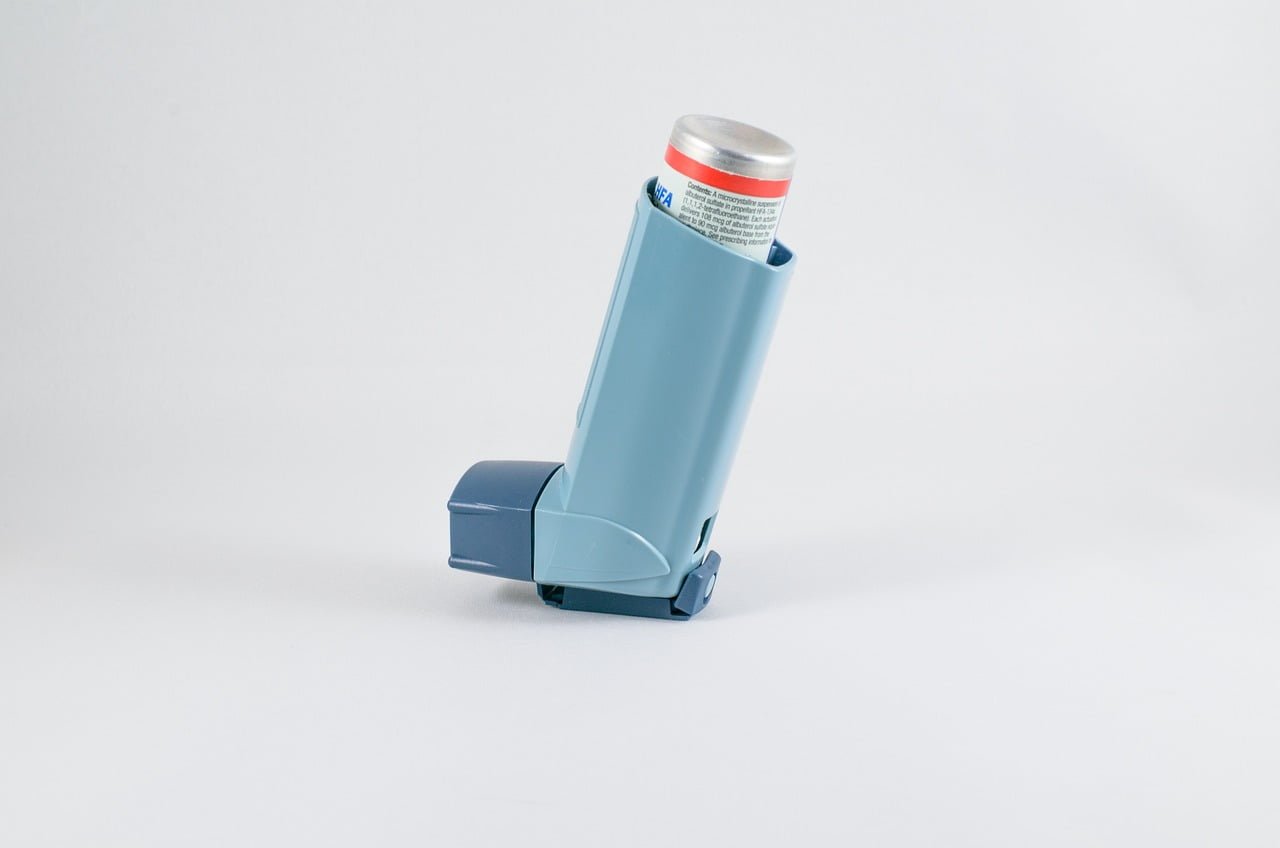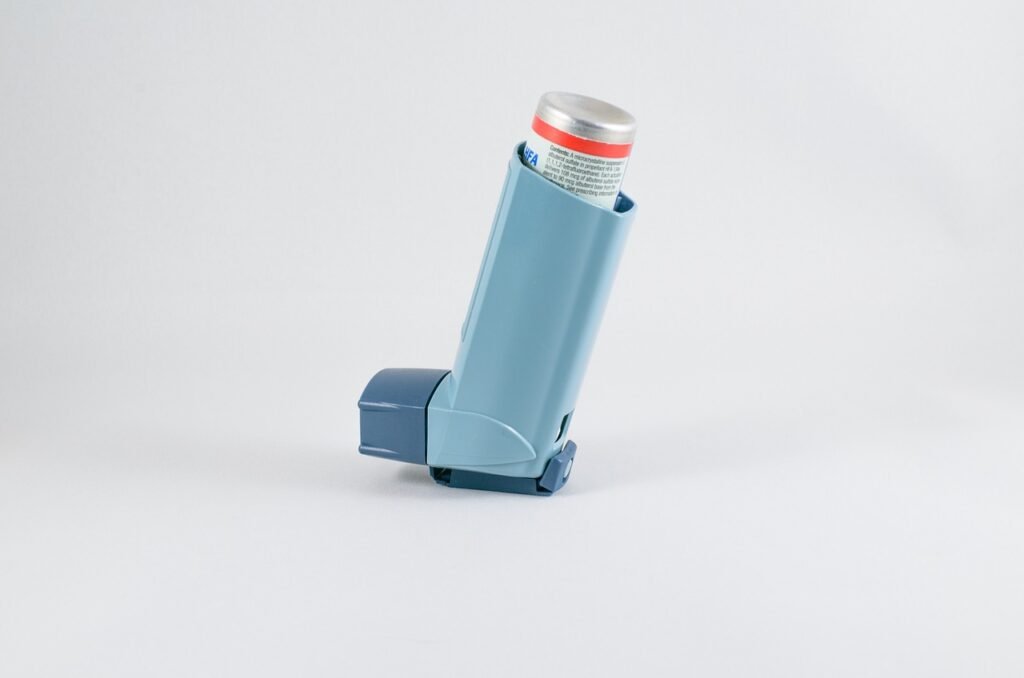
Living with asthma can be challenging, but with the right management and support, you can live a normal and fulfilling life. Asthma, a chronic respiratory condition, affects millions of people worldwide. This article explores the different aspects of managing asthma and provides tips and strategies to help you navigate daily life while effectively controlling your symptoms. From understanding triggers to adopting a proactive approach, discover how you can ensure a normal and enjoyable lifestyle while keeping asthma in check.

Understanding Asthma
What is asthma?
Asthma is a chronic respiratory condition that affects millions of people worldwide. It is characterized by inflammation and narrowing of the airways, leading to symptoms such as coughing, wheezing, chest tightness, and shortness of breath. While asthma cannot be cured, it can be effectively managed with the right treatment and lifestyle adjustments.
Causes of asthma
The exact cause of asthma is still not fully understood, but it is believed to be a combination of genetic and environmental factors. People with a family history of asthma or allergies are more likely to develop the condition. Additionally, exposure to certain irritants such as tobacco smoke, air pollution, allergens, and respiratory infections can trigger the development of asthma in susceptible individuals.
Common triggers for asthma attacks
Asthma attacks, also known as exacerbations, can be triggered by various factors. Common triggers include allergens such as pollen, pet dander, dust mites, and mold. Other triggers include respiratory infections, cold air, exercise, stress, certain medications, and exposure to irritants like strong odors or chemicals. By recognizing and avoiding these triggers, individuals with asthma can reduce the frequency and severity of attacks.
Diagnosis and Treatment of Asthma
How is asthma diagnosed?
If you suspect you have asthma, it is important to seek medical attention for a proper diagnosis. Your healthcare provider will take into account your medical history, perform a physical examination, and may order lung function tests, such as spirometry, to assess how well your lungs are functioning. Allergen testing may also be conducted to identify any specific triggers that may be contributing to your symptoms.
Types of asthma medication
Asthma medications can be broadly classified into two categories: relievers and controllers. Relievers, also known as rescue medications, provide immediate relief during an asthma attack by relaxing the airway muscles. Controllers, on the other hand, are long-term medications that help prevent and manage asthma symptoms by reducing airway inflammation and keeping the airways open. These may include inhaled corticosteroids, long-acting beta-agonists, leukotriene modifiers, and immunomodulators, among others.
Managing asthma symptoms
In addition to medication, lifestyle modifications play a crucial role in managing asthma symptoms. Avoiding triggers, such as allergens or irritants, is essential. It is also important to maintain good indoor air quality by regularly cleaning and dusting your home, as well as using air purifiers. Implementing proper cleaning techniques, using allergy-proof bedding, and ensuring proper ventilation can further help in reducing allergen exposure.
Creating an asthma action plan
An asthma action plan is a personalized document that outlines the steps to be taken in managing your asthma. It details your daily medication regimen, symptom management strategies, and emergency procedures. It is important to work together with your healthcare provider to create an asthma action plan that suits your needs. By following this plan, you can effectively control your asthma and have a clear understanding of what actions to take in different situations.
Living a Normal Life with Asthma
Educating yourself about asthma
One of the most important steps in managing asthma is educating yourself about the condition. Understand the underlying causes, triggers, and treatment options available. Stay informed about the latest research and developments in asthma management. By being knowledgeable about your condition, you can make informed decisions and take proactive steps towards managing your asthma effectively.
Taking control of your asthma
While asthma may present challenges, it is essential to remember that you can still live a full and active life. Take control of your asthma by adhering to your medication regimen, following your asthma action plan, and regularly monitoring your symptoms. By being proactive, you can minimize the impact asthma has on your daily life.
Managing your triggers
Identifying and managing your triggers is a crucial part of controlling asthma symptoms. Keep a diary to track when and where your symptoms occur, and what may have triggered them. By understanding your triggers, you can take steps to avoid or minimize exposure to them, reducing the likelihood of asthma attacks.
Maintaining a healthy lifestyle
Maintaining a healthy lifestyle is important for everyone, but it holds particular significance for individuals with asthma. Eat a balanced diet rich in fruits, vegetables, lean proteins, and whole grains to support overall health. Adequate sleep, stress management techniques, and regular exercise are also important components of a healthy lifestyle that can positively impact asthma management.
Importance of regular exercise
Contrary to popular belief, individuals with asthma can and should engage in regular exercise. Physical activity has numerous benefits for people with asthma, including improved lung function, increased cardiovascular fitness, and enhanced overall well-being. Consult with your healthcare provider to identify activities that are suitable for your condition and incorporate them into your routine.
Developing a support system
Living with asthma can be challenging at times, so having a strong support system can make a significant difference. Share your experiences and concerns with family, friends, and healthcare providers. Consider joining asthma support groups or online communities to connect with others who understand what you are going through. Having people who provide emotional support can be immensely helpful in managing your condition.
Traveling with asthma
Having asthma does not mean you cannot travel. With proper planning and preparation, you can enjoy exploring new places while managing your condition. Before traveling, ensure that you have enough medication and supplies to last throughout your trip. Research destination-specific triggers and take necessary precautions. Carry a copy of your asthma action plan and any relevant medical documents, and consider purchasing travel insurance that covers pre-existing conditions.
Dealing with stress and anxiety
Stress and anxiety can exacerbate asthma symptoms, so it is important to develop healthy coping mechanisms. Explore stress management techniques such as deep breathing, meditation, or engaging in activities you enjoy. Seek professional help if you are struggling with stress or anxiety, as managing your mental health can positively impact your asthma control.
Monitoring your asthma
Regular self-monitoring is an important aspect of asthma management. Pay attention to any changes in your symptoms and track your peak flow readings if recommended by your healthcare provider. By closely monitoring your asthma, you can identify any patterns, triggers, or deterioration in lung function early on and promptly seek medical attention if needed.
Regular check-ups with your healthcare provider
Even if your asthma is well-controlled, it is important to maintain regular check-ups with your healthcare provider. They can assess your lung function, review your medication regimen, and make any necessary adjustments to ensure optimal asthma management. Do not hesitate to discuss any concerns or questions you may have during these appointments.
Managing Asthma at Home
Creating an asthma-friendly home environment
Creating an asthma-friendly home environment involves taking steps to reduce allergens and irritants that can trigger asthma symptoms. Keep your home clean and dust-free by regularly vacuuming and wiping surfaces. Use hypoallergenic bedding covers to reduce exposure to dust mites. Avoid having pets in the bedroom, as their dander can worsen asthma symptoms.
Managing indoor air quality
Maintaining good indoor air quality is essential for individuals with asthma. Ensure your home is well-ventilated to minimize the accumulation of indoor pollutants. Use exhaust fans in bathrooms and kitchens to remove excess moisture and reduce the risk of mold growth. Consider using air purifiers with HEPA filters to remove allergens from the air.
Avoiding tobacco smoke
Smoke, whether from cigarettes or other sources, is a powerful trigger for asthma symptoms. If you or someone in your household smokes, it is crucial to quit smoking or create a smoke-free environment. Avoid exposure to second-hand smoke whenever possible, as it can significantly worsen your asthma symptoms and increase the risk of asthma attacks.
Proper cleaning techniques
When cleaning your home, it is important to use proper techniques to minimize the release of allergens and irritants. Use damp cloths or microfiber dusting tools instead of dry dusting. Vacuum carpets and upholstery regularly using a vacuum cleaner equipped with a HEPA filter. Avoid using air fresheners or strong cleaning chemicals that may irritate your airways.
Using allergy-proof bedding
Allergens such as dust mites and pet dander can accumulate in bedding and worsen asthma symptoms. Invest in allergy-proof bedding covers for your pillows, mattresses, and box springs to create a barrier between you and these allergens. Wash your bedding frequently in hot water to kill dust mites. Additionally, avoid sleeping with stuffed animals or other items that can trap allergens.
Keeping pets with asthma
If you have asthma and are considering having a pet, it is important to take certain factors into consideration. Allergens from pet dander, saliva, or urine can trigger asthma symptoms in sensitive individuals. If you are allergic to a specific type of animal, it is best to avoid having that pet. However, if you already have a pet, consider keeping them out of your bedroom and frequently grooming them to minimize allergen exposure.
Preventing and controlling mold and dust mites
Mold and dust mites are common allergens that can worsen asthma symptoms. To prevent mold, regularly check for any signs of moisture or leaks in your home and address them promptly. Keep humidity levels below 50% to inhibit the growth of mold. Encase mattresses, pillows, and cushions in allergen-proof covers to prevent dust mite infestations.
Maintaining proper humidity levels
Maintaining proper humidity levels in your home is important for asthma management. High humidity can encourage the growth of mold and dust mites, while low humidity can cause dryness and irritation of the airways. Use a dehumidifier to control humidity levels in damp areas such as basements or bathrooms. In dry climates, a humidifier can add moisture to the air to prevent excessive dryness.
Ensuring proper ventilation
Proper ventilation in your home is crucial for reducing the concentration of indoor pollutants and maintaining good air quality. Open windows or use exhaust fans when cooking or showering to remove excess moisture and reduce the risk of mold growth. Install and regularly clean air filters in heating and cooling systems to trap airborne particles and improve air circulation.

Asthma and Exercise
Benefits of exercise for people with asthma
Contrary to popular belief, exercise is highly beneficial for individuals with asthma. Regular physical activity can improve lung function, strengthen respiratory muscles, and enhance overall fitness. Exercise also helps maintain a healthy body weight, reduces the risk of other chronic conditions, and boosts mental well-being.
Choosing appropriate physical activities
While exercise is generally beneficial, it is important for individuals with asthma to choose activities that are well-tolerated and minimize the risk of triggering symptoms. Low-impact exercises such as walking, swimming, cycling, and yoga are often well-suited for people with asthma. Avoid activities that involve prolonged, intense exertion or exposure to cold, dry air, as they may increase the likelihood of asthma symptoms.
Tips for exercising with asthma
To ensure a safe and enjoyable exercise experience, consider the following tips:
- Always warm up before exercising to prepare your body for the activity.
- Use your reliever medication as prescribed by your healthcare provider before starting exercise.
- Wear appropriate clothing and protect yourself from cold air or other environmental triggers.
- Gradually increase the intensity and duration of your exercise routine to build endurance over time.
- Pay attention to your body and listen to any warning signs or symptoms. Stop and rest if you experience any difficulty breathing or chest tightness.
Using asthma medications before exercise
For individuals with exercise-induced asthma, using a reliever medication before physical activity can help prevent symptoms. Your healthcare provider may prescribe a short-acting beta-agonist inhaler (often referred to as a “blue inhaler”) to be used 10-15 minutes prior to exercise. This medication helps relax the airway muscles and opens up the airways, making it easier to breathe during exercise.
Warming up and cooling down
Before starting any exercise, it is important to warm up your body to prepare it for physical activity. Light aerobic exercises, stretching, and gradual warm-up activities can help prevent sudden onset of symptoms. Cooling down after exercise with gentle stretching and slowing down gradually allows your body to recover and minimizes the chance of post-exercise symptoms.
Knowing your limits
While it is important to stay active, it is equally important to know your limits and not overexert yourself. Listen to your body and recognize when you need to rest or take a break. Pushing past your limits can lead to symptoms and may increase the risk of an asthma attack.
Incorporating breathing techniques
Practicing specific breathing techniques can help individuals with asthma better manage their symptoms during exercise. Diaphragmatic breathing, also known as belly breathing, involves taking slow, deep breaths from the diaphragm rather than shallow, rapid breaths from the chest. This technique can help prevent hyperventilation and enhance respiratory efficiency during physical activity.
Asthma and Nutrition
Importance of a healthy diet for asthma control
Maintaining a healthy diet is important for overall health, including asthma control. A balanced diet rich in fruits, vegetables, whole grains, and lean proteins provides the necessary nutrients to support immune function and reduce inflammation in the body. A healthy diet can also help maintain a healthy weight, which in turn can improve lung function and reduce the severity of asthma symptoms.
Foods that may help manage asthma symptoms
While food alone cannot cure asthma, certain nutrients found in specific foods may help manage symptoms. Foods rich in omega-3 fatty acids, such as fatty fish (salmon, mackerel) and flaxseeds, have anti-inflammatory properties that can potentially reduce airway inflammation. Likewise, fruits high in antioxidants, such as berries and oranges, have been associated with improved lung function. However, individual responses to specific foods may vary, so it is essential to consult with a healthcare provider or registered dietitian before making any significant dietary changes.
Foods to avoid or limit with asthma
Some individuals with asthma may find that certain foods trigger their symptoms. While the specific trigger foods can vary from person to person, common culprits include dairy products (especially full-fat milk), eggs, shellfish, nuts, and food additives such as sulfites. Keeping a food diary and monitoring your symptoms can help identify any potential food triggers. If you suspect that certain foods worsen your asthma symptoms, it is advisable to consult with a healthcare provider or a registered dietitian to determine the most appropriate dietary approach for your specific needs.
Maintaining a balanced diet
A balanced diet is key to supporting overall health and asthma control. Aim to include a variety of fruits, vegetables, whole grains, lean proteins, and healthy fats in your meals. Portion control is also important to maintain a healthy body weight, as excess weight can worsen asthma symptoms. If you need guidance on developing a balanced diet specific to your needs, seek advice from a registered dietitian.
Staying hydrated
Proper hydration is essential for individuals with asthma. Drinking an adequate amount of water helps keep airways moist, making it easier to breathe. It is recommended to drink at least eight glasses of water per day, and more during periods of increased physical activity or in hot weather. Avoid excessive intake of sugary beverages or caffeine, as they can have dehydrating effects.
Considering dietary supplements
While a balanced diet should provide most of the necessary nutrients for asthma control, in some cases, dietary supplements may be recommended. Supplements such as vitamin C, vitamin D, or omega-3 fatty acids may have beneficial effects for some individuals with asthma. However, it is essential to consult with a healthcare provider before starting any supplements to ensure their safety and appropriateness for your specific health needs.

Asthma at School or Work
Communicating with teachers or colleagues
For individuals with asthma attending school or working in a professional setting, open communication is vital. Inform your teachers, professors, or colleagues about your asthma condition so that they are aware of any special accommodations or support you may need. Discuss your asthma action plan and emergency procedures with them, allowing them to understand how to assist you during an asthma attack.
Educating others about asthma
In addition to communicating about your asthma, take the opportunity to educate others about the condition. Asthma is often misunderstood, so raising awareness and providing accurate information can help reduce stigma and foster a supportive environment. Share educational resources, participate in asthma awareness events, or give presentations to dispel myths and promote understanding about the condition.
Creating an asthma action plan for school or work
Asthma action plans are not only important for individuals to manage their condition but also for schools and workplaces to have a clear protocol in place. Work with your healthcare provider to develop an asthma action plan specifically tailored to your school or work environment. Ensure that key individuals, such as school nurses, teachers, or supervisors, are familiar with the plan and know how to implement it in case of an emergency.
Making necessary accommodations
Schools and workplaces are required to make reasonable accommodations for individuals with asthma under disability laws such as the Americans with Disabilities Act (ADA). Work with relevant authorities to identify and implement any necessary accommodations that can help you manage your asthma effectively. This may include measures like allowing for the use of medication during school or work hours, adjusting schedules to avoid triggers, or providing access to clean air environments.
Managing asthma triggers in the environment
Identifying and managing asthma triggers in the school or work environment is crucial for maintaining good asthma control. Work with school administrators, employers, or colleagues to minimize exposure to common triggers, such as tobacco smoke, allergens, or strong odors. Implement measures like improving ventilation systems, creating designated smoke-free areas, or using air purifiers to reduce the presence of triggers in shared spaces.
Dealing with Asthma Attacks
Recognizing the signs of an asthma attack
Recognizing the signs of an asthma attack is crucial for taking prompt action. Common signs and symptoms include coughing, wheezing, breathlessness, chest tightness, and difficulty speaking in full sentences. You may also notice a decrease in your peak flow readings compared to your usual baseline. It is important to be familiar with your own individual warning signs to be able to intervene quickly and effectively.
Steps to take during an asthma attack
If you experience an asthma attack, it is important to remain calm and take the following steps:
- Sit up straight and try to relax your breathing.
- Take your reliever medication (usually a short-acting beta-agonist inhaler) as prescribed or recommended by your healthcare provider.
- Use your inhaler with a spacer device if available, as it can enhance the delivery of medication to your lungs.
- Take slow, deep breaths, focusing on exhaling fully to empty your lungs.
- If there is no improvement within a few minutes or your symptoms worsen, seek immediate medical assistance.
Using a rescue inhaler
A rescue inhaler, often referred to as a reliever or emergency inhaler, is a medication that provides quick relief during an asthma attack. It typically contains a short-acting beta-agonist, which helps relax the airway muscles and opens up the airways, making breathing easier. It is important to carry your rescue inhaler with you at all times and use it as prescribed or recommended by your healthcare provider during an asthma attack.
Seeking immediate medical assistance
If your symptoms do not improve with the use of a rescue inhaler, or if they worsen rapidly, it is important to seek immediate medical assistance. Call emergency services or go to the nearest emergency department. Severe asthma attacks, also known as status asthmaticus, can be life-threatening and require immediate medical intervention.
Preventing future asthma attacks
While it is not always possible to completely prevent asthma attacks, adherence to your asthma action plan, proper medication use, and trigger avoidance can greatly reduce the risk. Work closely with your healthcare provider to review and update your treatment regimen as needed. Learn how to recognize warning signs and take early action to prevent attacks. Regular follow-up appointments with your healthcare provider are essential to assess your asthma control and make any necessary adjustments to your management plan.
Pregnancy and Asthma
Effect of asthma on pregnancy
If you have asthma and are planning to become pregnant or are already pregnant, it is important to understand how asthma can affect pregnancy. While most women with asthma have uncomplicated pregnancies, uncontrolled asthma or asthma exacerbations during pregnancy can increase the risk of complications. Poorly controlled asthma can lead to reduced oxygen supply to the fetus, low birth weight, preterm birth, and other pregnancy-related complications.
Managing asthma during pregnancy
Managing asthma during pregnancy is essential to ensure the well-being of both the mother and the baby. It is important to continue taking your prescribed asthma medications and closely follow your asthma action plan. Keep regular follow-up appointments with your healthcare provider to monitor your asthma control and make any necessary adjustments to your treatment regimen. Consult with your healthcare provider if you have any concerns or questions regarding the safety of specific medications during pregnancy.
Potential risks and considerations
Certain asthma medications, particularly oral corticosteroids, may carry potential risks during pregnancy. These medications are typically used for short durations and at the lowest effective dose if necessary to control asthma symptoms. Your healthcare provider will carefully evaluate the risks and benefits of any medication adjustments during pregnancy to ensure optimal asthma control while minimizing potential risks to the baby.
Importance of prenatal care
Regular prenatal care is important for all pregnant individuals, regardless of whether or not they have asthma. Attend all scheduled prenatal appointments and inform your healthcare provider about your asthma condition. Regular check-ups allow your healthcare provider to monitor your overall health and address any concerns or complications that may arise during pregnancy.
Medication safety during pregnancy
It is natural to have concerns about the safety of asthma medications during pregnancy. However, it is important to remember that uncontrolled asthma poses a greater risk to both the mother and the baby than the potential risks associated with properly managed asthma medication. Discuss your asthma management plan with your healthcare provider to ensure that your medications are safe and appropriate for use during pregnancy. In most cases, the benefits of controlling asthma outweigh the risks of medication use.
Emotional Well-being with Asthma
Emotional impact of living with asthma
Living with asthma can have both physical and emotional impacts. The limitations and uncertainties associated with managing a chronic condition can lead to feelings of frustration, anxiety, and stress. Asthma can also impact self-esteem and social interactions, as individuals may feel self-conscious about their symptoms or need to avoid certain situations or activities. It is important to address these emotional aspects of asthma to maintain overall well-being.
Coping strategies for emotional well-being
Developing effective coping strategies can help individuals with asthma manage the emotional impact of the condition. Engage in stress-reducing activities such as deep breathing exercises, meditation, or yoga. Seek professional help or join support groups to gain valuable insights, share experiences, and receive guidance on managing emotions related to asthma. Set realistic goals and celebrate achievements to maintain a positive mindset.
Seeking support from others
Support from family, friends, and healthcare providers is essential for emotional well-being with asthma. Openly communicate with loved ones about your experiences, concerns, and needs. Ensure that your healthcare provider is aware of any emotional struggles you may be facing, as they can provide guidance and appropriate referrals. Surround yourself with understanding and empathetic individuals who can offer support and encouragement.
Joining asthma support groups
Joining asthma support groups, whether in person or online, can provide valuable support and a sense of community. Interacting with individuals who are going through similar experiences can help alleviate feelings of isolation and normalize the challenges of living with asthma. Sharing tips, strategies, and success stories can empower individuals with asthma to proactively manage their condition and improve their emotional well-being.
Addressing mental health concerns
Asthma can sometimes contribute to or exacerbate mental health concerns such as anxiety or depression. It is important to address these concerns and seek appropriate professional help if needed. Mental health care providers can offer interventions and therapies tailored to your specific needs, helping you develop coping strategies and improve your overall emotional well-being.
In conclusion, while asthma is a chronic condition that requires ongoing management, it is absolutely possible to live a normal life with asthma. Understanding the condition, following a treatment plan, and implementing lifestyle adjustments are key to effectively managing asthma and minimizing its impact on daily life. By educating yourself, staying proactive, and seeking support, you can live a fulfilling life while keeping your asthma under control. Remember to consult with your healthcare provider for personalized guidance and recommendations to ensure the best possible outcomes in your journey with asthma.









